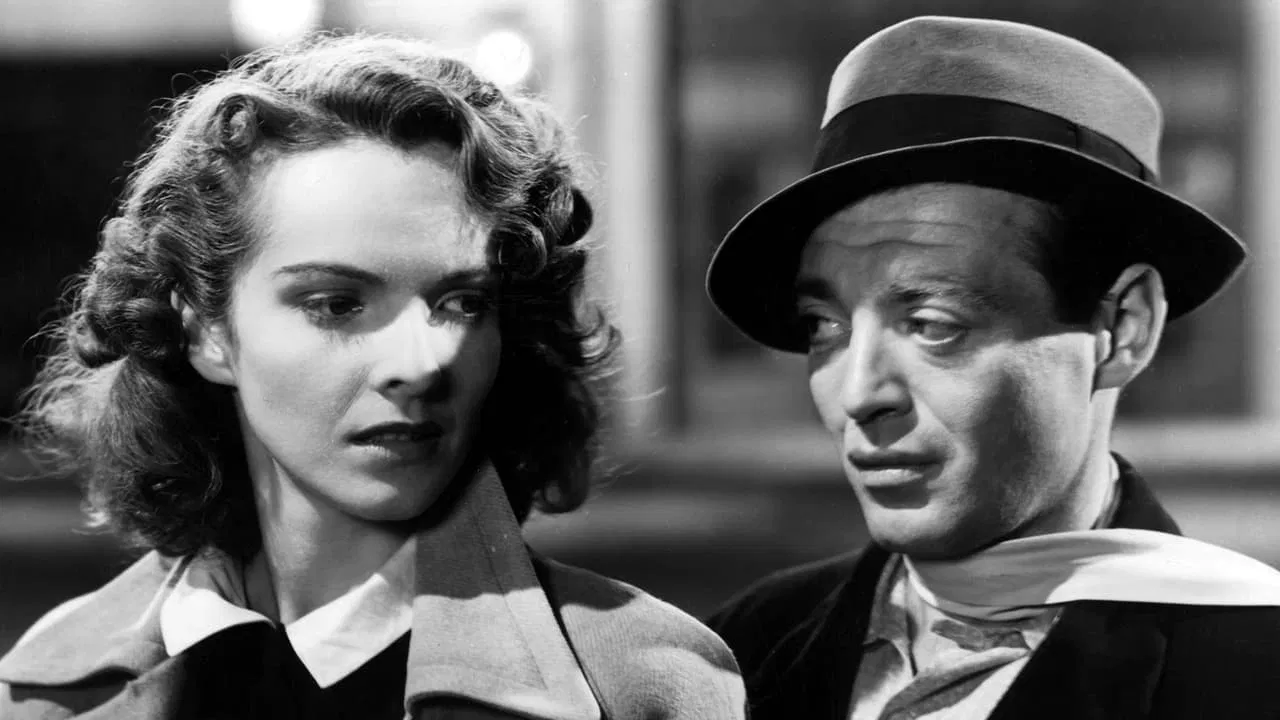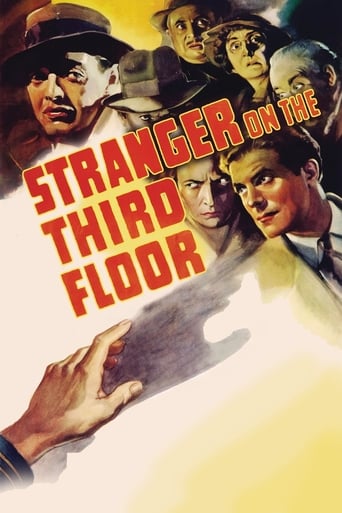

I title my review "Pass/Fail", because in some ways the film passes some tests of what makes a good film, and in other ways it fails some tests of what makes a good film.Let's begin with the biggest "fail" -- the acting. Now that might surprise you when you consider the fame of the two lead actors -- John McGuire and Margaret Tallichet. Okay, I'm being sarcastic. McGuire went from being a lead in "B" pictures to bit parts...and in this film you can see why. Tallichet's biggest successes in Hollywood were being screen-tested for the role of Scarlett O'Hara and becoming the wife of director William Wyler. Neither McGuire or Tallichet have significant Hollywood resumes, and here their acting is -- at best -- awkward, and certainly amateurish. That's not to say they are totally unpleasant on screen; at least they try hard.And then we come to Peter Lorre. I have come to appreciate Lorre's early screen appearances. There was something very unique about him. But here, he has almost no actual dialog until the end of the film. He is pretty much relegated to being seen, in order to become the leading suspect. Lorre was not exactly new to Hollywood at this point, but his most famous roles were yet to come. I wondered if his teeth were that bad, or if they were doctored up here to make him look more menacing.Probably the best acting here is from Elisha Cook Jr. -- the little creep -- who is probably wrongly convicted of murder...thus the basis of the plot. Cook wasn't a very diverse actor, but he was damned good at what he did. This was his sixth film, and like Lorre, his best work was coming up, not long after this film. BTW, at the very end of the film you get to see him with a huge smile on his face! A rarity! So, what's the "pass" part. Films that are somewhat unique get bonus points from me. And, this film is pretty unique. First, it may have been the first American noir film made (though not released first). But there is plenty of interesting imagery here that you rarely see in old films, and are well worth noting.I must admit wondering if this was a throw-away pic for RKO Pictures. After all, they assigned directorial responsibilities to that finest of directors -- Boris Ingster. Okay, my sarcasm is showing through, again.All things considered, I'm glad to have watched this film, but will never do so again. Pass.Fail, but mostly fail...yet still somewhat intriguing.
... View MoreAfter discovering a dead man with his throat slit, reporter Mike Ward (John McGuire) proves to be the key witness in the murder trial, putting away the accused to face the death penalty. His fiancée Jane (Margaret Tillachet) harbours doubts about the man's guilt, causing Ward to question himself and what he really saw. Returning to his apartment, he has a brief encounter with a strange man (Peter Lorre) who he sees lurking around the building, and after finding his neighbour murdered in the same way, he cowers into a paranoid and disillusioned state. When Ward is arrested on suspicion of the murder, Jane wanders the streets searching for this strange man with bulging eyes, thick lips, and a white scarf.Although it wasn't released until after similar films of the genre, Stranger on the Third Floor is considered to be the first 'true' film noir. The classic tale of an innocent man out to prove his innocence is given a slight spin with a short central section depicting Ward's descent into panic. This is punctured with a quite strange dream sequence that is filmed quite nicely given the obvious budget limitations. These limitations tend to damage the film's potential impact, with McGuire's quite outlandish performance making it disappointing that director Boris Ingster couldn't afford a better lead. With very literal narration, he flails around as if locked in an operatic Russian silent, feeling it important to inform the audience "I'm tired," after yawning and stretching.The extremely dull first two-thirds of the film spend most of the time tip-toeing around the strongest plot thread, which is Jane's search for Peter Lorre's creepy stranger. Lorre saves the film, having been a veteran of German Expressionism, is perfectly suited to the film's overwrought, dramatic style. His soft voice and small stature make him barely imposing, but subtly unnerving. Running at just over an hour, Stranger was never intended to be challenging, but a simple thriller, and that's exactly what it is. But it's also frightfully pedestrian, offering none of the sleaze or sweat I usually love from B-grade noirs. It certainly had a key role to play in the development of one of the most successful genres in American cinema history, but this, combined with Lorre's memorable but sadly brief appearance, are the only reasons why this film is fleetingly remembered.www.the-wrath-of-blog.blogspot.com
... View MoreThe reporter Michael 'Mike' Ward (John McGuire) is promoted in the newspaper when he becomes the key witness of the murder trial of Joe Briggs (Elisha Cook Jr.), a young man that he had seen threatening the victim Nick in his coffee shop and then leaving the place with Nick with sliced neck. Joe swears innocence and despite the circumstantial evidence, he is convicted and sentenced to the electric chair. Mike's fiancée Jane (Margaret Tallichet) feels uncomfortable with the sentence and believes that Joe might be innocent. Mike loses his confidence and feels remorse for his testimony accusing Joe. One night, Mike brings Jane to his room and his nosy neighbor Albert Meng (Charles Halton) brings the landlord that expels Jane from the boarding house. Mike threatens Meng and later he sees a stranger with bulging eyes (Peter Lorre) on his floor that runs away from him. He has a weird nightmare and when he wakes up, he finds that Meng is murdered with sliced neck similar to Nick. Mike calls the police and is arrested as prime suspect of both murders. Jane seeks out the stranger on the streets to save her fiancé. "Stranger on the Third Floor" is considered the first film-noir of the cinema history. The story is engaging, supported by magnificent cinematography, and the sequence of Mike's nightmare is fantastic. Peter Lorre is creepy and the conclusion is naive on the present days. My vote is seven.Title (Brazil): "O Homem dos Olhos Esbugalhados" ("The Man with Bulging Eyes")
... View MoreStranger on the Third Floor is directed by Boris Ingster and co-written by Frank Partos and Nathanael West. It stars Peter Lorre, John McGuire, Margaret Tallichet and Elisha Cook Jr. Music is by Roy Webb and cinematography by Nicholas Musuraca. Michael Ward is a news reporter who is the key witness in a murder trial. His evidence, circumstantial at best, is instrumental in getting a guilty verdict delivered on suspect Joe Briggs (Cook Jr.). When his girlfriend Jane (Tallichet) casts doubt over Briggs' guilt, and his part in the evidence, Michael becomes haunted by the fact he may have sent an innocent man to death row. Things further compound his troubled mind as a sinister stranger is lurking around his rooming house building Often referred to as the first true film noir picture, Stranger on the Third Floor hardly set the cinematic world alight upon its release. With Lorre the draw card barely in it and its production value no more than that of a B movie programmer, it's not hard to envisage some of those 1940's critics stroking their beards and pondering how to write about such a film. Aesthetically the film caused some consternation, too, while the snarky aside to the legal system, and the people involved in such, adds some intrigue into the narrative mix. For a film running at just over an hour, it was doing well to make a mark: favourably or otherwise!The truth is is that at its core, Ingster's film is no more than a capably acted crime thriller, but what cloaks that core are hugely impressive visuals that paint a skew whiff world of a paranoid mind at work. The script, while light as spoken, does indeed carry cynicism, but this aspect only impacts because of the expressionistic visuals and baroque like imagery. Characters, and the actors playing them, ultimately are playing second fiddle to style over substance, but in this instance it's OK. With Musuraca weaving his photographic magic around heavy shadows, stilted angles and high contrast framing, film contains one of the greatest dream/nightmare sequences to have ever graced/dominated film noir. This alone makes the film essential viewing for noir enthusiasts. The ending is all too swift and contrived, distastefully accompanied by the jolly old music that opened up the piece. But again this is forgiven in light of what has gone before it, for now, nothing can be seen in quite the same way. A most interesting and sneaky little picture this one. 7.5/10
... View More